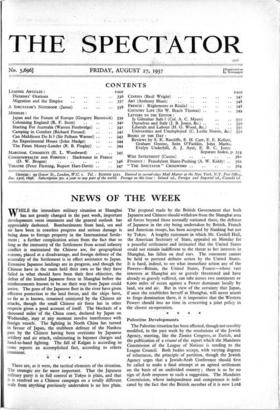Palestine Developments The Palestine situation has been affected, though not
sensibly modified, in the past week by the resolutions of the Jewish Agency, meeting, like the Zionist Congress, at Zurich, and the publication of a résumé of the report which the Mandates Commission of the League of Nations is sending to the League Council. Both bodies accept, with varying degrees of reluctance, the principle of partition, though the Jewish Agency urges that a Jewish-Arab Conference should first be called to make a final attempt at an agreed settlement on the basis of an undivided country ; there is so far no sign of Arab response to such a suggestion. The Mandates Commission, whose independence and competence is indi- cated by the fact that the British member of it is now Lord Halley and was for fourteen years previously Lord Lugard, suggests that since neither Jews nor Arabs are yet ready for full independence there should be a transitional period during which either a system of cantonisation, Great Britain control- - ling finance and foreign policy, should be established, or the present mandate should be replaced by two separate mandates, over Jewish and Arab territory respectively, an arrangement which would mean that either people could be given full independence when it was ready for it, not -neces- sarily both at the same time. There is much to be said for this proposal, but the argument in favour of a final settlement as soon as possible, in view of the uncertainty and unrest prevailing in Palestine itself, seems the stronger. It is now for the League Council to pronounce, though it is hard to see how the Council could impose on the British Government responsibilities which the Government was not ready to accept.
* * * *



































